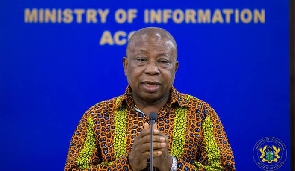Health Minister Kwaku Agyemang-Manu has given the assurance that the Celebro-Spinal Meningitis (CSM) and COVID-19, in the Upper West Region (UWR) of Ghana, are under control.
“Mr Speaker, as a result of the hard work of the regional and municipal health personnel in the Upper West Region and the unwavering support of my Ministry, I can confidently say that COVID-19 and CSM are under control in the Upper West Region, the Minister said in a statement to Parliament in Accra.
The statement, read for him by Dr. Bernard Okoe-Boye, one of his deputies, and Member of Parliament for Ledzokuku Constituency put the death toll of CSM in the UWR, where there are 273 reported cases as of April 29, 2020, at 43.
It has the breakdown as 10 in Jirapa, one in Lawra, 14 in Nadowli, 13 in Nandom, four in Wa Municipal, and on in Wa West.
However, Mr Agyemang Manu reported that the “situation with CSM is under control,” and a “visit to some affected municipalities and communities by one of my deputies revealed that currently only four cases of meningitis are being attended to, one case at Nadowli, three cases at Nandom with zero cases at Jirapa.
“The disease shows that we are no more at the epidemic level.”
According to the Minister, laboratory results of the cases showed that the first wave of the epidemic curve that occurred between week two and four were caused mainly by streptococcus, and the second epidemic wave between week eight and 13 were caused by Meningococcus; and an analysis of 63 laboratory results from 63 cases sampled showed proportions of Streptococcus-19, influenza-one, Neisseria meningitides sero x-38, and unspecified Neisseria meningitides-four and NMW-one.
The Minister informed the House that 60 per cent of the samples give the information that “we are having an epidemic that was being caused by a bacteria with no vaccine on the planet.
However, he added that “there are vaccines that cover the common strains of Neisseria Meningitis such as A, B, and C which are notorious for CSM outbreaks and epidemics.”
Mr Agyemang Manu attributed fatalities partly to late reporting, but discounted assertions that the Government of Ghana gave all its attention to COVID-19 at the expense of CSM.
”The epidemic is also not because vaccination wasn’t done or is not being done; it is because we are dealing with a novel bacterium (NMX) of which there is no vaccine in the world as I speak,” the Minister explained.
As of COVID-19 in the UWR, the Minister said there are eight recorded cases of the disease in the region, with one recovery, integrated into the society, and doing well.
He gave the assurance that the Ministry would not be complacent, added that it constantly would ensure adequate preparation and surveillance at all times with all diseases of public health importance.
Dr Abdul-Rashid Pelpuo, MP for Wa Central Constituency in the UWR, however, disagreed with the Minister, and said: ” I don’t think CSM is under control.”
He said some of the information is speculative and wondered why the number of cases which was higher, two weeks ago had rather plummeted.
Dr Pelpuo called for enough drugs and facilities to manage the CSM disease, as he described CSM as a terrible danger more dangerous that COVID-19 because full recovery is not guaranteed.
Dr Pelpuo said people from the UWR are worried at the way the disease was being handled and would be happy if the Ministry would take their concerns to erase the impression that they are being treated as second rate citizens.
Chairman of the Committee on Health Dr Kwabena Twum-Nuamah stressed continuous education and early reporting, as the disease has symptoms similar to malaria.
Minority Chief Mubarak Muntaka called on the Ministry of Health and the Ghana Health Service to ensure that public hospitals and health facilities attend to cases of health issues at the outpatient's department, rather than turning them away so as not to aggravate possible cases of CSM and other diseases.
General News of Friday, 1 May 2020
Source: GNA













